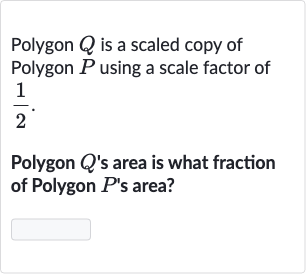AI tutor
Welcome to Bytelearn!
Let’s check out your problem:

Polygon is a scaled copy of Polygon using a scale factor of .Polygon 's area is what fraction of Polygon area?
Full solution
Q. Polygon is a scaled copy of Polygon using a scale factor of .Polygon 's area is what fraction of Polygon area?
- Identify Relationship: Identify the relationship between the scale factor and the area of similar polygons. When a polygon is scaled by a factor of , the area is scaled by a factor of . In this case, the scale factor is .
- Calculate Scale Factor: Calculate the area scale factor by squaring the linear scale factor. The linear scale factor is , so the area scale factor is .
- Perform Calculation: Perform the calculation for the area scale factor. . This means that the area of Polygon is the area of Polygon .
More problems from Scale drawings: word problems
QuestionGet tutor help
QuestionGet tutor help
QuestionGet tutor help
QuestionGet tutor help
QuestionGet tutor help
